Alumni
Programs Our Scholars Have Matriculated:
- Albert Einstein College of Medicine
- Boston University
- Colorado University
- Emory University
- Howard University School of Medicine
- Johns Hopkins University School of Medicine
- Meharry Medical College
- Ross University School of Medicine
- Stony Brook University
- UNC Chapel Hill
- University of Alabama Birmingham
- University of Maryland School of Medicine Graduate Program in Life Sciences
- University of Minnesota
- University of Pennsylvania
- Vanderbilt University
- Virginia Tech University
Cohort 6
Andrew Alvarez
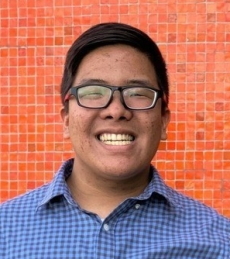 I received my associate’s degree in chemistry from Cypress Community College in 2019 and my bachelor’s degree in biochemistry from California State University, Long Beach (CSULB) in 2021. I conducted my first research project with Dr. Kamil Godula through the 2017 Summer Training Academy for Research Success (STARS) program, where I synthesized mucin-mimetic polymers as a model to study the viscoelastic gelling properties of mucin and mucin’s ability to block the entry of pathogens. At CSULB, I joined the two-year NIH-funded MARC research program and conducted drug delivery research with Dr. Katarzyna Slowinska. I independently lead my project in analyzing the cell-penetrating and drug-releasing capability of hybrid collagen peptide drug carriers to maximize the synergistic effects of combination chemotherapy.
I received my associate’s degree in chemistry from Cypress Community College in 2019 and my bachelor’s degree in biochemistry from California State University, Long Beach (CSULB) in 2021. I conducted my first research project with Dr. Kamil Godula through the 2017 Summer Training Academy for Research Success (STARS) program, where I synthesized mucin-mimetic polymers as a model to study the viscoelastic gelling properties of mucin and mucin’s ability to block the entry of pathogens. At CSULB, I joined the two-year NIH-funded MARC research program and conducted drug delivery research with Dr. Katarzyna Slowinska. I independently lead my project in analyzing the cell-penetrating and drug-releasing capability of hybrid collagen peptide drug carriers to maximize the synergistic effects of combination chemotherapy.
After graduating with my bachelor’s degree, I wanted to pursue full-time research at a doctoral-granting institution and joined the STAR-PREP program. I work with Dr. Ryan Pearson on analyzing the formulation-dependent parameters on the immunomodulatory properties of microfluidics-generated polymeric nanoparticles. With this full-time research experience, I hope to become more competitive for graduate school and also take full advantage of conducting intensive and collaborative research in the field of drug delivery and nanotechnology. After STAR-PREP, I plan to obtain a PhD in pharmaceutical sciences and lead a research laboratory in developing novel drug delivery systems to treat hard-to-cure diseases such as cancer and/or immunological diseases.
Belen Avelar
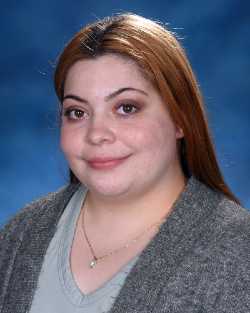
In 2018, I earned my Associate of Arts in General Studies at Prince George’s Community College and then earned my Bachelor of Science in Kinesiology at the University of Maryland, College Park in 2021. At UMD, I participated in The First-Year Innovation & Research Experience (FIRE), where I learned about how stress impacts our health and our relationships. Under the guidance of Dr. Sarah Racz, I studied the role of hostile behavior between parents and adolescents during structured conflict resolution tasks. I worked on developing a coding scheme for measuring and characterizing nonverbal hostile behavior in adult participants, in addition to administering behavioral, physiological, and observational assessments to research participants.
During the summer of 2020, I also participated in UMD’s Aging, Diversity, and Professional Development (UM ADAPT) program. I engaged in didactic discussion each week on research ethics topics including protections of human and animal subjects, authorship responsibilities, data collection ownership, scientific misconduct, and conflicts of interest.
As a STAR-PREP scholar, I am working in Dr. Fontaine’s lab to understand the interaction between mesenchymal stromal cells and various components of peripheral whole blood. I am using techniques such as flow cytometry to measure surface marker expression and cytokine production of mesenchymal stromal cells and blood products to understand how stromal cells modulate immune cell function. After STAR-PREP, I plan to pursue a PhD in exercise physiology or cell physiology to study the role of metabolic and physical stress in skeletal muscle dysfunction.
Claudia Hernandez-Chavez
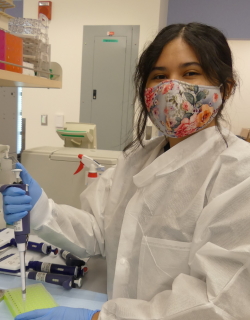
I graduated with honors from the University of California, Merced with a B.S. in Molecular and Cellular Biology. My senior year I received a Louis Stokes CAMP Fellowship where I worked with Dr. Juris Grasis in his Immunoviromics Lab. In his lab I conducted Bioinformatics research, creating phylogenetic trees for genes in the RNAi pathway (Dicer, Argonaute, and Aubergine), primarily focusing on 10 basal Metazoan animals, Drosophila melanogaster, and Homo sapiens. Through the construction of these phylogenetic trees, our goal was to provide a better understanding of where these antiviral genes arose in animal evolution and how they have managed to be conserved over time. I was then able to present my contributions to this research at several conferences like SACNAS, ABRCMS, and the NSF CAMP Statewide Symposium, where I received a Special Merit Award. Through this experience, I was recommended for a second fellowship with the eClose Institute where I was sent lab equipment and was able to create my own lab at home during the pandemic. My project was to use Drosophila melanogaster as a model to test if dietary interventions like Vitamin A and Vitamin C have an effect on the signaling of inflammation.
Now, as a STAR-PREP Scholar, I am currently working in the Gut Microbiome lab of Dr. Bing Ma, where I am researching the gut microbiome in preterm infants. More specifically, my project involves characterizing the mechanistic role that Bifidobacterium plays in postnatal maturation of the intestinal barrier in 200 preterm infants with high or low intestinal permeability. Our hope is that it will provide a biomarker species/ screening tool for “leaky-gut” and prevent conditions like Necrotizing Enterocolitis (NEC) in clinical practice. In the future, I hope to utilize my research experiences to pursue a Ph.D. in Microbiology and Immunology to better understand how microbes influence our lives every day.
Taya Lee
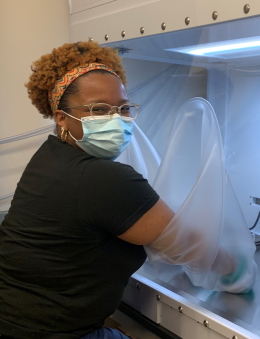
I obtained a bachelor's degree in Bioengineering with a concentration in biomaterials from Clemson University. During my time at Clemson, I participated in various research experiences. I spent three years working in the lab of Dr. Delphine Dean to develop biomedical innovations for low-and-middle-income countries. With a team, I created a biosensor able to monitor antiretroviral drug adherence in HIV/AIDs patients. I also gained my first cancer research experience the summer of my junior year in Dr. Angela Alexander-Bryant's nanomedicine lab. There I volunteered and shadowed a PhD candidate creating a targeted delivery system for ovarian cancer.
As a STAR-PREP scholar, I am currently under the guidance of Dr. Eli Bar, studying the effects of microenvironmental factors on Glioblastoma tumor progression. I'm excited to gain more knowledge of cancer research, bench experience, and critical thinking skills to become an independent researcher within the field.
My previous research and personal experiences have sparked my interest in cancer treatments, more specifically immunotherapies. My goal is to pursue a PhD in bioengineering and hope to work towards making cancer treatments available for all.
Taylor Phillips-Jones
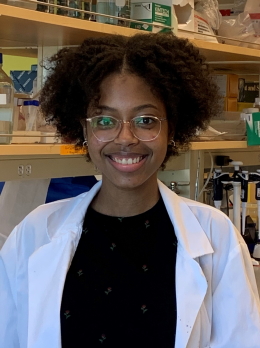
I graduated with honors from Howard University in May 2021 with a B.S. in Biology and minors in Psychology, Spanish, and Chemistry. I was also a member of the inaugural cohort of Karsh STEM Scholars at Howard University. During my undergraduate career, I conducted research in various labs focused on understanding the pathogenesis of neurological and psychiatric diseases.
I spent four years in the lab of Dr. Kimberlei Richardson at the Howard University College of Medicine investigating the activation of subregions of the paraventricular nucleus of the thalamus in response to binge eating behavior in rodents. I also participated in the Life Sciences Summer Undergraduate Research Program at the University of Minnesota, where I studied the neuroimmune factors that contribute to chronic neuropathic pain under the guidance of Dr. Lucy Vulchanova. The following summer, I participated in the Gateways to Laboratory Program at Weill Cornell Medical College. Through the program, I worked in Dr. Winrich Freiwald’s lab at Rockefeller University to create an experimental paradigm for studying attention utilizing aspects of virtual reality.
During my previous research experiences, I developed a passion for neuroscience and discovered how scientific research can be used to advance medicine. My current research interests involve exploring the interaction of the immune and nervous systems in both homeostatic and disease conditions. As a STAR-PREP scholar, I am currently working under the mentorship of Dr. Margaret McCarthy to study the role of immune cells in neurodevelopment. I am excited to develop new laboratory skills and explore my interest in neuroimmunology. In the future, I plan to pursue an MD/PhD with the long-term goal of developing better treatments for patients with neurological disorders.
Kylie Sumner
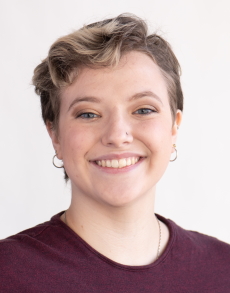
I graduated with distinction from Worcester Polytechnic Institute in 2021 with a Bachelors of Science in Biochemistry with a minor in Biology and Biotechnology. Starting in high school and continuing into college, I had a summer internship at Adimab LLC. During my few summers at Adimab, I worked with the Antibody Discovery team on their project of isolating neutralizing antibodies against yellow fever virus. This experience at Adimab showed me that I loved working in a laboratory and that I had a strong interest in immunology.
During my undergraduate years, I participated in the International Genetically Engineered Machine Competition (iGEM) where I conducted research on the effects of antifreeze proteins on the growth of biofilms. I also worked as a laboratory assistant in a biology and biotechnology laboratory where I assisted in the creation of a lead biosensor.
During this year, as a STAR-PREP scholar, I am working in Dr. Robert Ernst’s laboratory with his senior graduate student, Richard Smith on creating fast diagnostics of gram-negative bacterial infections by using fast lipid analysis technique (FLAT) and Matrix-assisted laser desorption/ionization time-of-flight mass spectrometry (MALDI-TOF MS or simply MALDI).
I hope to use all of the knowledge and experiences that I accumulate during this next year to succeed in my own graduate school experience, as I plan to pursue a PhD in immunology after the completion of the STAR-PREP program.
William Witt
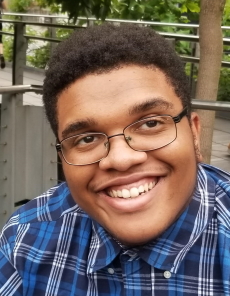
I graduated with my Bachelor's in Biochemistry and Molecular Biology with a Minor in Public Health from Goucher College. During my undergraduate years, I participated in a range of research projects, experiencing the breadth of research experiences the biological sciences have to offer. I worked with Dr. Robert Yasuda in studying the effects and potential application of CRISPR as a therapeutic agent on nicotinic neural receptors. I worked with the DC Department of Public Health in the construction of community outreach projects for testing the quality of the food given in summer programs and helping the lab develop tests and procedures for testing for Zika.
On campus, I worked with Dr. Jay Garaychochea in his study of G-coupled protein receptor ligands, in particular the olfactory receptor PSGR2 and its C.elegans analog NPR-18. My work instilled in me a passion for studying the biochemical and genetic mechanisms of disease and a strong belief in the importance of science outreach.
As a STAR-Prep student, I’ve been working with the Center for Vaccine Development’s Malaria Research Center under the esteemed Dr. Shannon Takala Harrison. My project focuses on measuring the effects of PfCRT mutations and Plasmepsin2 multicopy on the ability of geographically categorized strains of Plasmodium falciparum on its ability to resist piqueraquine and its overall fitness. Upon completing the program, I intend to pursue a degree in Biochemistry.
Cohort 5
Aidaelis Martínez Hernández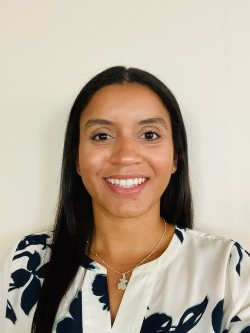
I obtained my bachelor's degree with high honors in Industrial Microbiology from the University of Puerto Rico, Mayagüez Campus (UPRM). Over the years of my undergraduate career, several research and internship opportunities from organic chemistry to immunology have shaped my interest in pursuing graduate-level education.
In my last two years of undergraduate studies, I participated in a one-year internship with Abbvie Biotechnology Limited (2019) and a six-month internship with CDI Laboratories (2020). During my year at Abbvie Biotechnology Limited, I worked with the raw materials program and process development of Humira, a monoclonal antibody used to treat several autoimmune diseases. Under this program, my project aimed to evaluate the next year's campaign raw materials through lab-scale bioreactor experiments. Later, eager to elevate my undergraduate knowledge of immunology research, I joined CDI Laboratories. Here, as a hybridoma production intern, I worked with the purification and analysis of ultra-specific monoclonal antibodies samples received from several research laboratories such as MIT, JHU, and NIH. These were rewarding and meaningful experiences since they focused on developing a commercial drug and the production of research antibodies for further development of potential treatments.
Now, as a STAR-PREP scholar, I am working under the guidance of Dr. Magali Fontaine. Under Dr. Fontaine's research laboratory, there has been an incredible effort to contribute to developing a treatment for patients infected with SARS-CoV-2. Hence, we are analyzing an eIND to mitigate the effects of the infection on high-risk SARS-CoV-2 patients. This clinical study aims to provide infected patients with access to the investigational convalescent plasma, obtained from recovered SARS-CoV-2 patients, which could help them surpass the disease. In addition to SARS-CoV-2 treatment efforts, Dr. Fontaine's primary focus is transfusion medicine. Additional laboratory projects aim to study pathogen inactivation strategies for platelet transfusion and red cell immunomodulation through leukocyte binding to glycophorin A.
All aspects considered, I am very interested in biomedical science research—specifically, in those among studying immunological disorders. Therefore, I plan to pursue a Ph.D. in Immunology. As a future research scientist, my career goal is to conduct leading projects in an industrial environment to develop novel cellular models to advance immunology research and create potential treatments. I am confident the STAR-PREP will provide me with guidance, mentorship, and relevant research experiences that will prepare me to succeed in my doctoral program.
Jeff Inen
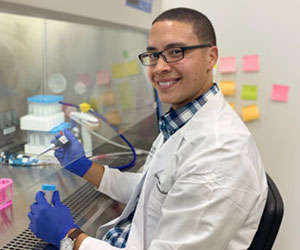 I graduated from the University of Maryland Baltimore County in December 2018 with a B.S. in Biological Sciences. I spent three and a half years working in the lab of Dr. Charles Bieberich developing mouse models of prostate cancer. My work in the lab focused on the induction of inflammation in mice missing the tumor suppressor Pten and it’s role in the resulting progression of prostate cancer.
I graduated from the University of Maryland Baltimore County in December 2018 with a B.S. in Biological Sciences. I spent three and a half years working in the lab of Dr. Charles Bieberich developing mouse models of prostate cancer. My work in the lab focused on the induction of inflammation in mice missing the tumor suppressor Pten and it’s role in the resulting progression of prostate cancer.
Under the exceptional mentorship of Dr. Bieberich, I discovered my love of research. I realized how fascinating it can be to try to find solutions to problems to which no one in the world knows the answer. In research I found that I am able to reach a level of creativity, imagination and fulfillment that I wouldn’t be able to achieve anywhere else.
I am currently working in the Poulopoulos lab under Dr. Ryan Richardson on projects utilizing in vitro and in vivo CRISPR genome editing. My research will be investigating the complex temporal and spatial properties of mTOR, a protein possessing proliferative and oncogenic potential, as well as investigating methods to improve CRISPR in vivo gene knock in.
Taking full advantage of the mentorship, research opportunities and support of the STAR-PREP program, I am working towards pursuing an MD-PhD in order to start a research clinic to find therapies for diseases that disproportionately affect minority populations.
Zewde Ingram.jpg)
I graduated with honors from the University of Maryland, College Park in May 2020 with a Bachelors of Science in Cell Biology and Genetics. My first research experience was a summer internship at the Johns Hopkins Applied Physics Lab studying the utility of various body sensors to detect stress in first responders. I engaged in monitoring the physiological status of research participants, which steered my interest toward pursuing human subject research. Later as an undergraduate, I was able to acquire my first benchwork research position at the Avian Behavioral Neuroscience Lab directed by Dr. Gregory Ball. During this time, I helped investigate how sex hormones modulate brain plasticity and song patterns in canaries.
Currently as a STAR-PREP post-baccalaureate research fellow, I have the privilege of working in Dr. Tonya Webb's lab researching ovarian cancer and tumor immunology using cell and mouse models. I joined STAR-PREP to gain research experience and refine my lab techniques. Furthermore, I am grateful and eager to make the best of this opportunity to immerse myself in a field of interest at UMB, a respected institution. After my tenure as a PREP scholar, I know I will gain the essential preparation that I will need to be successful in graduate school, and ultimately my future research pursuits.
Through my previous course work and current research experience, I have developed a keen interest in cancer biology and immunology. I hope to one day receive a Ph.D. in cancer or cell biology and make translational contributions to cancer research, while also assisting others that are underrepresented in science, both as patients and researchers.
Saovleak Khim
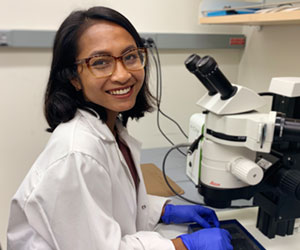
I graduated with honors from Temple University with a BS in Neuroscience. My research interest involves neural circuit formation and its impact on neurodevelopmental diseases and mental illnesses. I hope to pursue an MD/PhD where I may further conduct research to contribute to the development of novel therapies while applying my knowledge to care for patients dealing with these diseases.
During a summer apprenticeship at Monell Chemical Senses Center, I worked on a study with Dr. Marco Tizzano to characterize the olfactory epithelium regeneration following drug induced damage. I aimed to investigate the role of microvilli cells and the trigeminal system in modulating the regeneration process. This project piqued my interest in neural development and circuit integration. As a MARC scholar, I transitioned into Dr. Anna R. Moore’s lab at Temple University whose work focuses on using Rem2 as a tool to study activity-dependent mechanisms of circuit formation and functions in the mammalian brain. Rem2 is a Ras-like GTPase implicated in dendritic morphology and intrinsic excitability. Together we created a pilot study looking at whether Rem2 is required for adult neurogenesis with the goal of elucidating molecular mechanisms governing new neuron growth and integration in established circuit.
To prepare myself as a physician-scientist, I participated in Drexel University’s Mini-Medical summer program where I had the opportunity to join physicians and surgeons in both the clinic and the operating room. This experience revealed the importance of an open patient-physician relationship since diagnosis and treatments are based on both laboratory tests results and the patient’s history and lifestyle. Through other shadowing experiences and attending meetings/rounds in different specialties like dermatology, cardiology, neuropsychology, and critical care, I felt a pull to helping patients living with treatment resistant diseases and seeking alternative therapeutic options. This was the bridge between my passion for research and my love for medicine. In addition to the intellectual persuit of science, it is also a tool to change lives.
As a STAR-PREP scholar, I am working under the guidance of Dr. Alexandros Poulopoulos and Dr. Margaret McCarthy studying the mechanisms underlying circuit formation during brain development and diseases. I am excited to further develop my bench skills and gain more insight into how cutting edge research is used to advance medicine.
Darius Mckoy.jpg)
I received my B.S. in Biological Sciences and minor in Psychology with honors at the University of Maryland, Baltimore County (UMBC) in May 2020. I studied as a member of the Meyerhoff, HHMI, and MARC U*STAR Scholars Programs. For 2.5 years, I studied anoxia tolerance in zebrafish at UMBC using the candidate gene approach. For one summer, I studied the role of the Substantia nigra in sleep-wake control in mice at University of California, Berkeley using cell-type specific lesioning. In addition to research, I was able to volunteer with different diverse populations throughout Baltimore, travel to numerous conferences, and work as a tutor/teaching assistant. At the end of my studies, I was honored to be selected for the Phi Beta Kappa Society.
As a STAR-PREP scholar, I am analyzing data in a clinical trial under the mentorship of Dr. Deanna Kelly. I am studying the effects of clozapine administration on the treatment of schizophrenia in African American patients. I am excited to learn epidemiological and clinical techniques to make a more direct impact on people’s lives through research.
I hope to pursue a graduate degree in epidemiology and become a public health officer. My skills learned in the program will be integral in my success.
Cynthia Melendrez 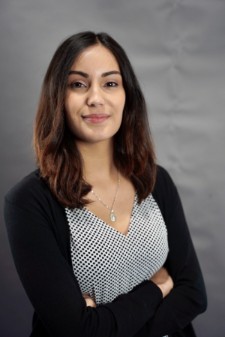
I received my B.S. in Chemical Engineering from San Jose State University in May of 2020. During my undergraduate career, I was selected to be a member of the RISE, LSAMP, and SSCL Scholar Programs that were offered for students conducting bioscience-based research. I was working in the SSCL Lab under Dr. Abraham Wolcott, who focused on amination chemistry to achieve a homogenous amine surface that would allow the attachment of functional and bioactive molecules for biolabeling and biosensing purposes. As the amine subgroup leader, my role was to create and modify the amination synthesis protocols with the goal of achieving a higher level of ND functionalization. To conclusively characterize the ND surface, I utilized three overlapping spectroscopy techniques at facilities such as SLAC National Accelerator Laboratory and Lawrence Berkeley National Laboratory. At the conclusion of this 3-year research experience, I was given the opportunity to publish our unique discoveries to the Journal of American Chemical Society and will be listed as the first author.
With the experience I gained in Dr. Wolcott’s SSCL Lab, I earned a SULI DoE fellowship at Stanford’s SLAC National Accelerator Laboratory and later a biochemical engineering internship at Intelligent Fiber Optic Systems. Through both opportunities, I was given the opportunity to work with a diverse group, from different disciplines and nationalities. It was incredible to personally experience the level of communication and advancement achieved which arose from our diverse contributions.
Currently, I am a STAR-PREP Post-Baccalaureate fellow at the University of Maryland’s School of Medicine which focuses on preparing underrepresented groups in the biomedical sciences for entry into top-notch graduate programs. Through this program, I am conducting biomarker drug-discovery research at the Greenebaum Comprehensive Cancer Center, under DTRS Deputy Director Dr. Isabel Jackson. I will also be leading a separate innovative project focused on researching a translational oncology technique known as Flash Therapy. With the training and knowledge, I have gained throughout the years, I am driven to pursue a graduate education in cancer biology with an emphasis on pharmaceutical development.
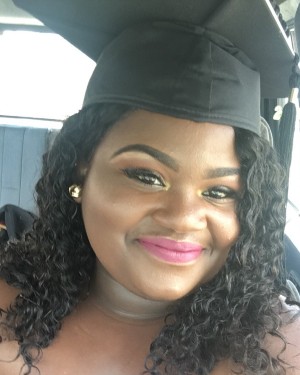
Shanaliz Natta
I attained my Bachelor of Science in biology from the University of the Virgin Islands (UVI) in May 2018. During my time at UVI I have taken part in various research internships that have molded my interests in not only biomedical research but pursing a doctoral degree in microbiology. In my senior year at UVI I worked under the mentorship of Dr. Jennilee Robinson. My project was focused on developing a more accurate and efficient way of detecting a Haemohormidium-like blood parasite infection in Stegastes adustus “Dusky damselfish.” What I enjoyed about this project was the ability to conduct meaningful research at my home institution where I was learning so much about how these fish in Virgin Islands waters were becoming ill. Through this experience my curiosity in infectious diseases was ignited. I found myself asking why are only Dusky damselfish affected by this parasite and how are they becoming infected?
After attaining my bachelor’s, I wanted to gain more in-depth research training, so I left the Virgin Islands in August 2018 to pursue a Master of Science at Towson University in the Bridges to the Doctorate Program (B2D). During my time in the B2D program I completed a four-week summer mini rotation at a lab of my choice at the University of Maryland School of Medicine (UMSOM). I chose to work under the guidance of Dr. Sharon Tennant whose research focus is in bacterial pathogenesis, vaccine development, and global health at the Center for Vaccine Development and Global Health (CVD). My project was focused on determining whether Salmonella serogroup C1 strains are phagocytosed by macrophages more efficiently than Salmonella strains from other serogroups. The rationale is that Salmonella serogroup C have been shown to be responsible for a large burden of disease.
In my second year as a master’s student I was able to continue this project where it was then expanded into a master’s thesis. I was very enthusiastic to continue working on my project and I was most excited to see how it will progress over the next year. To date, I have generated data that suggests strains of serogroup C1 are taken up at higher levels than strains of other serogroups. In August 2020 I was awarded my Master of Science in biology from Towson University and invited to take part in UMB STAR PREP program. As a STAR PREP scholar, I again have the opportunity to continue working in Dr. Tennant’s lab. I am currently performing experiments to confirm my results obtained last summer as well as investigating intracellular survival and replication of Salmonella serogroup C1.
Through these experiences I have found a strong passion for microbial pathogenesis, host-pathogen interactions, and vaccine development. My goal is to attain a doctoral degree in microbiology and immunology where I then hope to dedicate my post-doctoral career to vaccine research and development against infectious diseases that plague immunocompromised populations. My aim as a STAR-PREP scholar is to continue developing my critical thinking skills, analytical skills, and independence--skills that I deem important for a successful scientist.
Cohort 4
Carl Bannerman
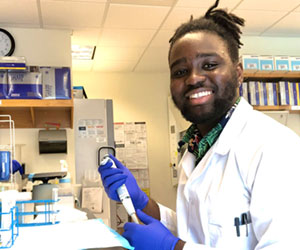 I graduated from the University of Maryland, Baltimore County in May 2019 with a Bachelor of Science in Biological Sciences. Prior to that, I graduated from the Community College of Baltimore County with an Associates of Science in Science. During my undergraduate career, I was a part of the MARC U*STAR, Meyerhoff, McNair Scholar Programs and the BUILD Training Program which supported my passion for the biomedical sciences.
I graduated from the University of Maryland, Baltimore County in May 2019 with a Bachelor of Science in Biological Sciences. Prior to that, I graduated from the Community College of Baltimore County with an Associates of Science in Science. During my undergraduate career, I was a part of the MARC U*STAR, Meyerhoff, McNair Scholar Programs and the BUILD Training Program which supported my passion for the biomedical sciences.
Needless to say, I am very interested in biomedical science research. I have conducted research at institutions such as the University of Maryland, Baltimore County and the Johns Hopkins School of Medicine. These experiences were in the fields of microbiology, genetics and cellular biology. I hope to one day pursue infectious disease research and treat patients suffering from infectious diseases as a physician-scientist.
This year I will be working in Dr. Takala-Harrison’s Lab under the at the University of Maryland School of Medicine. My project will focus on characterizing the role of Plasmodium falciparum PfCRT mutations in piperaquine resistance. I hope to accomplish this through the use of the CRISPR/cas9 system for gene editing and whole genome sequence data to understand the genetic lineage and origin of resistant parasites. Through the wonderful opportunities and resources provided by STAR-PREP, I hope to expand my research portfolio and continue on to pursue an MD/PhD combined degree.
Uriel Jean-Baptiste
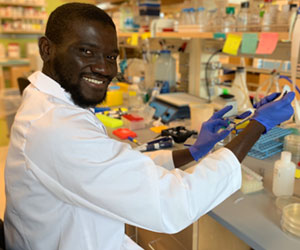 I graduated from Florida State University (FSU) in May 2018 with a bachelors in Biochemistry. While at FSU, I conducted undergraduate research in the lab of Dr. Hong Li in the Institute of Molecular Biophysics investigating the structural parameters that confer higher enzyme specificity onto Acidothermus cellulolyticus Cas9 (AceCas9).
I graduated from Florida State University (FSU) in May 2018 with a bachelors in Biochemistry. While at FSU, I conducted undergraduate research in the lab of Dr. Hong Li in the Institute of Molecular Biophysics investigating the structural parameters that confer higher enzyme specificity onto Acidothermus cellulolyticus Cas9 (AceCas9).
Post undergraduate, my journey continued in the lab of Dr. Vince Luca at the Moffitt Cancer center evolving high affinity peptide inhibitors for the NLRP3 inflammasome complex.
I want to pursue a PhD in biochemistry and structural biology to understand protein-structure relationships and protein-protein interactions in a variety of cellular contexts. This has led me to the STAR-PREP Postbaccalaureate program where I will be mentored by Dr. Alex Poulopoulos and Dr. Bekir Altas in the Poulopoulos lab. Under Dr. Altas, I am studying proteins that are extremely important because of their role in axonal projections across the corpus callosum. Certain neurodevelopmental disorders are correlated with the improper projection of these axons from hemisphere to hemisphere.
Jatia Mills
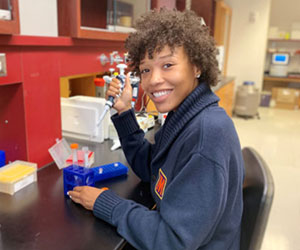 I am a recent honors graduate of Morgan State University with a Bachelors of Science in Biology. I was born and raised right here in Maryland. I am eager to continue my education by enrolling in graduate school and obtaining my PhD in Pathology.
I am a recent honors graduate of Morgan State University with a Bachelors of Science in Biology. I was born and raised right here in Maryland. I am eager to continue my education by enrolling in graduate school and obtaining my PhD in Pathology.
I am currently a part of the NIH funded postbac program, STAR-PREP, within the University of Maryland Baltimore School of Medicine. My current research is on the immune system of nurse sharks under the supervision of Dr. Helen Dooley at the Institute of Marine and Environmental Technology (IMET).
My goal for the future is to obtain my Ph.D., study comparative neuropathology, and some day obtain my D.V.M. as well. I am looking forward to learning as much as possible with my time while continuing to develop my research skills.
Darex Vera-Rodriguez
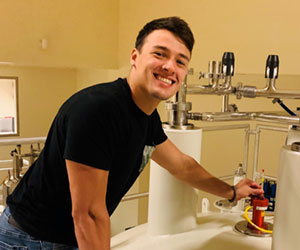 I have a bachelor’s degree in Industrial Biotechnology with a Minor in Project Management from the University of Puerto Rico, Mayagüez Campus (UPRM). As a rising researcher, one of the key topics that caught my attention was the study of macromolecules and their physical-chemical behavior in the human body. Following the topics in this research area, I participated in a summer program at the University of Pittsburgh, conducting health sciences research using computational (in-silico) approaches.
I have a bachelor’s degree in Industrial Biotechnology with a Minor in Project Management from the University of Puerto Rico, Mayagüez Campus (UPRM). As a rising researcher, one of the key topics that caught my attention was the study of macromolecules and their physical-chemical behavior in the human body. Following the topics in this research area, I participated in a summer program at the University of Pittsburgh, conducting health sciences research using computational (in-silico) approaches.
Working under the guidance of Dr. Carlos Camacho, I was able to track drug discovery methods using a ligands’ library. I was looking for ligands that could potentially inhibit HRas oncogenic protein activity in excess proliferation in the pancreas and lung, preventing cancer development. I continued this project in Dr. Alberto Santana’s lab at UPRM and implemented novel computational techniques for molecular dynamics simulations and energy minimization steps analyzing Ras isoforms K-Ras and N-Ras for potential oncogenic activity.
In my last year of undergraduate studies, I performed an industry practice at Janssen Pharmaceutical Companies of Johnson & Johnson (J&J). One of the projects that I worked on was the historical and technical analysis of protein loading and the purification process for optimization of chromatography columns, efficiency, and protein final bulk productivity.
Industry techniques such as time management, communication approaches, risk considerations, and organizational methods were learned and implemented in the field. Using these skills resulted in the success of all the projects assigned. This was an excellent opportunity to utilize my minor and gain professional development at the industry level.
My interests in any field are always directed towards diversity and innovation. This was one of the main reasons I decided to apply to STAR-PREP, where I am working in Dr. David Weber’s lab studying S100 proteins proportionality in malignant melanoma cancer. We are implementing structural biology and biochemical techniques such as nuclear magnetic resonance (NMR) spectroscopy and column chromatography for drug discovery approaches on potential S100 inhibitors and tumor suppressor proteins.
My goal as a researcher, is to combine in-silico and in-vitro together for a wide understanding and discussion of methods and results. With the academic experiences and professional development STAR-PREP is providing me, I will have all the necessary skills to pursue a PhD in Biophysics and Biochemistry.
Cohort 3
Yessenia Cedeno
I graduated with honors from the University of Puerto Rico Mayagüez Campus with a BS in Industrial Biotechnology. During my undergraduate career, I had the opportunity to be exposed to different research areas in Biomedical Sciences. I participated in several laboratory rotations at Ponce Health and Science University in Puerto Rico. After my rotations in PHSU, I had the privilege to work for two years with Vanessa Rivera Amill, PhD. Our research interest was to study the Effect of HIV-1 gp120 expression on glutamate metabolism in human astrocytes.
In order to follow with my scientific growth, I conducted a research project in Dr. Maribella Domenech’s Lab at UPRM. I worked in a tumor-inflammatory in vitro model of Hedgehog signaling. The focus of my research project was to evaluate the contributions of Hedgehog signaling in macrophages phenotypes M1 and M2 in the growth and stem cell distribution of breast tumor cells using a new 3 micro-well array as a cell culture platform.
During the last year of my bachelor, I performed my industrial biotechnology practice in Abbvie Biotechnology Ltd at Barceloneta, Puerto Rico. I was part of the Technical Operations department where I performed experiments in small scale bioreactor models to study raw materials and compounds in order to improve the cellular viability and cell performance for the production of Humira.
Currently as a STAR-PREP Research Fellow, I’m working under the guidance of Antonio Passaniti, PhD. whose research is focus in study RUNX family genes in breast cancer progression. Our goal is to study how RUNX genes interact with each other to regulate tumor growth and metastasis in breast cancer.
I hope that the STAR-PREP program at UMB help to expand my academic portfolio in order to pursue a PhD degree in Biomedical Engineering.
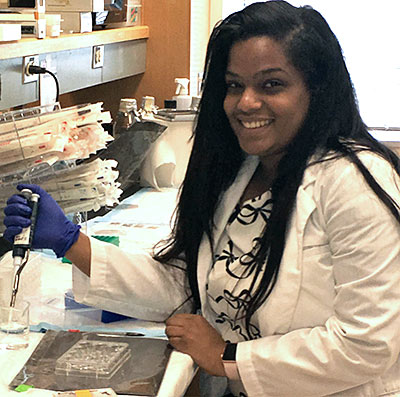 Kanisa Davidson
Kanisa Davidson
I graduated with honors from North Carolina Agricultural and Technical State University with my BA in Psychology. During my undergraduate career, I was appointed as a Research Initiative for Scientific Enhancement (RISE) Scholar and had the privilege of working as a research assistant under Dr. Antoinette Maldonado-Devincci for two years. I conducted an independent study observing neurosteroids and their neuroprotective properties through “exogenous use.” Our specific questions focused on increasing the most potent GABAergic neuroactive steroid, allopregnanolone in specific brain limbic regions of C57/B mouse models through exogenous administration of pregnenolone.
Currently at STAR PREP at UMB, I am excited to work under the guidance of Dr. Jessica Mong who’s lab focuses on ovarian steroids control in sleep and arousal system. My project observes estrogens protective role in central hearing in mice. We are investigating changes in microglial and astrocytes cell number activation that are indicative of neuroinflammation and tissue damage. Our hypothesis is that estrogen will protect against noise induced damage within the CNS.
With the knowledge and skills I have learned through all my research experiences I developed a passion for learning about neuropsychiatric disorders and neurodegenerative diseases. After growing as a researcher with experience with STAR PREP provides, I would like to pursue a graduate degree in neuroscience so that I can research to understand how neurological disorders develop during the normal process of aging and injuries to the brain.
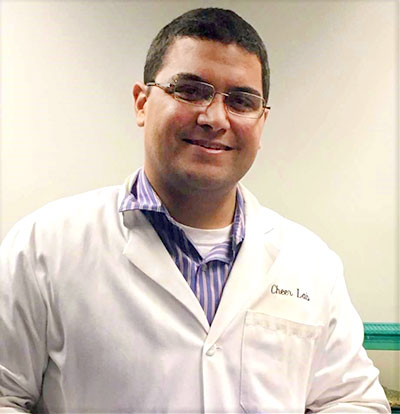 Antonio Figueiredo
Antonio Figueiredo
I graduated from the University at Buffalo with a B.S. in Biological Sciences, concentrating in Neuroscience and Cellular & Molecular Biology, and a B.A. in Chemistry in 2016.
During my undergraduate studies, I worked under Dr. Valerie Freriches analyzing samples of anions from local bodies of water, using Ion-Exchange HPLC, in order to study concentration gradients and determine the effects from both a human health and ecological standpoint. During my senior year, I worked under Dr. Sarah Walker examining the importance of phosphorylation zones on translation factor eIF4E by utilizing CRISPR to alter phosphorylation site in yeast cells.
Upon graduating, I accepted a research position at the University at Buffalo Research Institute on Addictions under Dr. Panayotis Thanos focusing on the role of fatty acid binding proteins as transporters of endocannabinoids. After one year as a research assistant, I was promoted to technician and lab manager, with additional duties of lab supervision, research assistant management, and experiment selection.
Currently, I am working under Dr. Joseph Cheer to further investigate the role of cannabinoid type 1 receptors on motivated behavior and memory in the Hippocampus. Upon finishing my time at STAR-PREP, I hope to pursue a PhD in Neuroscience and continue researching the endocannabinoid system and addiction.
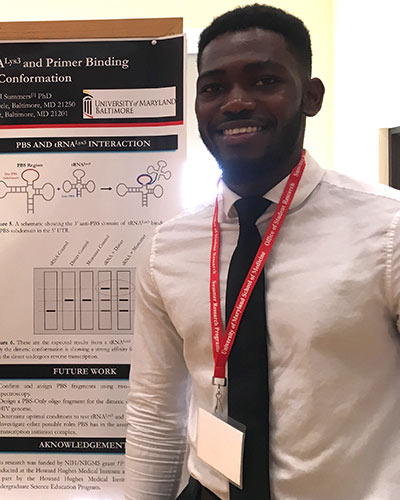 Dillion Francis
Dillion Francis
I graduated with honors from University of West Florida with a B.S. in Chemistry/Biochemistry. During my undergraduate career, I received funding support through the MARC U*STAR Scholars Program to conduct research full-time as a research assistant. My first exposure to research began in the physical chemistry laboratory of Dr. Karen Molek. Our research project focused on studying the growth kinetics of surface modified nanoparticles with potential applications in biology and medicine.
To broaden my knowledge base, I followed my burgeoning interest in the spectroscopic technique using nuclear magnetic resonance (NMR) spectroscopy. In the summer semester of 2016, I participated in the ten-week Summer Biomedical Training Program (SBTP) at University of Maryland Baltimore County (UMBC) working in Dr. Michael F. Summers’ laboratory to study retrovirus structure and function. I gained a better understanding of human immunodeficiency virus (HIV) clinical background as well as two-dimensional NMR spectroscopic techniques to study large biomolecules.
Through my research experiences, I gained an appreciation for the potential of research and how that potential can positively impact the medical field. As a STAR-PREP scholar, I plan to pursue a career as a physician-scientist to use the skill set I have gain to better serve people suffering from diseases that are not well understood yet. I am hopeful that my participation in the STAR-PREP program and mentorship received will guide me on the path to become a successful biomedical researcher.
Cassandra Jordan
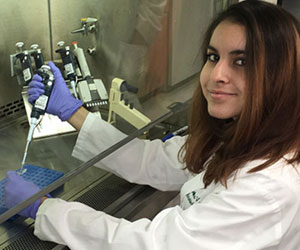
I graduated from Aurora University in May 2018 where I received my Bachelor of Science in Biology with a minor in Chemistry. Although I graduated from a smaller university that was not research heavy, I was able to acquire research experience that helped me to realize a career in the lab is right for me.
I was able to enroll in more advanced lab based courses as well as work alongside my professor and a few other students on a synthetic biology experiment, in which we developed a temperature sensitive biosensor (E. coli) through the use of the 2017 iGEM (International Genetically Engineered Machine) kit.
This year I will be working in Dr. Carbonetti’s lab to help in ongoing research investigating the bacteria primarily responsible for whooping cough, Bordetella pertussis. Through the research opportunities, guidance, and additional resources provided through the STARPREP program, I hope to pursue a PhD that would best prepare me to help further advance the field of biomedical sciences.
Cohort 2
Kaia Amoah
"I am a 2017 graduate of Hampton University where I received a BS in Cellular and Molecular Biology. I am fortunate to have had a diversity of research experiences, which has exposed me to various areas of concentration for my plans to pursue a MD/PhD. I was introduced to scientific research my freshman year of college when I interned at the Feinstein Institute in New York. At Feinstein, I researched prostate cancer epidemiology-- specifically analyzing biomarkers for prostate cancer metastasis. The following summer, I served as a research intern at the Virginia Tech Carilion School of Medicine where I examined Rotavirus genome replication. Most recently, I served as CRAB fellow at my undergraduate institution, and worked on a continuing research project that examined the genetic diversity among the red crab population in the Atlantic region. I have presented my research at various conferences and symposiums throughout my undergraduate career.
Currently, I work under the direction of Dr. Thomas Blanpied, who is conducting exciting research that examines the structural organization at synapses and the role that this plays in neuronal propagation. Specifically, my project will examine the role of Kynurenic acid in cognitive diseases such as Schizophrenia.
From this experience, I plan to build an extensive network of mentors in the field while also laying a strong foundation for what awaits me in my career as a physician-scientist. I thank STAR-PREP for giving me the opportunity to do just that."
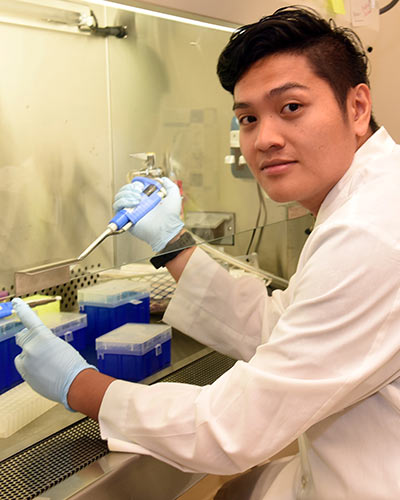 Mc Millan Ching
Mc Millan Ching
I graduated from the University of Hawaii at Manoa (UHM) with a BS in Molecular Biosciences and Biotechnology, and a BA in Philippine Language, Linguistics, and Literature. I conducted various research projects during my tenure as an undergraduate student in several academic and research institutions in the US and overseas. I was once a visiting scholar under Toshio Miki, PhD of the University of Southern California Keck School of Medicine investigating the engraftment of human amniotic epithelial stem cells in transgenic animal models for congenital liver diseases. I then participated in an international research training for tropical medicine, under the supervision of Sirida Youngchim, PhD, in Chiang Mai University, Thailand where I studied the pathogenesis of Penicillium marneffei, a fungal pathogen endemic to Southeast Asia that causes the AIDS-defining illness penicilliosis. I also worked under Linda Chang, MD of the Queen’s Medical Center in Honolulu for her clinical research on the effects of Cognitive Memory (CogMed) training in patients with HIV-Associated Neurocognitive Disorders (HAND). During my time at the UHM, my research thesis, sponsored by Dulal Borthakur, PhD, centered on the investigation of the molecular transport of iron via metal-chelating pathways in leguminous plants.
Here, at the University of Maryland School of Medicine, I am currently conducting research under the guidance of Jocelyn Reader, PhD, and Amy Fulton, PhD, whose research is focused on investigating the role of PGE2 pathway members EP4 and MRP4 in stem-like and tumor-initiating phenotypes of ovarian and breast cancers. My project is centered around investigating the effects of interrupting MRP4 and EP4 signaling pathways in ovarian cancer.
My ultimate goal is to become a physician scientist who can perform both PCR and CPR!
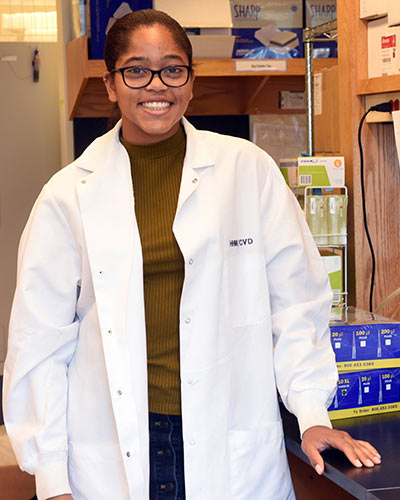
Dominique Earland
I graduated with Honors from Southern Methodist University with a Bachelor of Science in Biological Sciences and a Bachelor of Arts in Human Rights with Distinction in 2017. During my undergraduate career, I developed interests in maternal health and birth outcomes after completing social science and public health research.
I was fortunate to study these topics in a global health perspective while conducting research in the Epidemiology department of Cornwall Regional Hospital in Montego Bay, Jamaica. We focused on the predictors and prevalence of anemia in pregnancy in Western Jamaica. I was able to apply the knowledge I gained in a local setting through the Embrey Human Rights Community Outreach Fellowship. I developed an education and resource toolkit to address the high maternal mortality rate in Texas with the Fetal Infant Mortality Review (FIMR) of Parkland Hospital in Dallas, Texas.
I want to purse an MD/PhD to directly serve the health needs of the community as well as develop clinical research knowledge required to improve standards of care. Currently, I am working under Dr. Miriam Laufer, whose research is focused on malaria pathogenesis, disease burden, and drug resistance. We are studying the genetic polymorphism of MSP1, a malaria parasite surface protein, in asymptomatic Plasmodium falciparum infections.
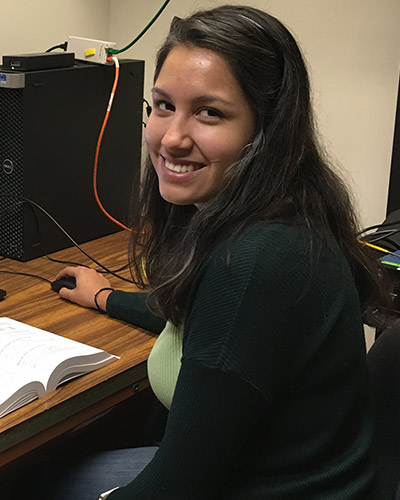 Edith Hernandez
Edith Hernandez
I graduated from The University of Texas at El Paso (UTEP) in 2017 with two B.S. degrees in Biology and Psychology. My main research interests revolve around the concept of drug abuse, addiction, and related behaviors. I am interested in pursuing a combined MD/PhD degree, which would allow me to continue my research endeavors and have the opportunity to apply my knowledge in the clinic as well.
My first 3 years at UTEP, I worked with Theodore V. Cooper, PhD, in the Prevention and Treatment in Clinical Health (PATCH) Lab. I assisted in the management of the smoking cessation clinic, StopLite and was part of the A Smoke-Free Paso del Norte Initiative and Tobacco Control Network in the bi-cultural region of El Paso, Texas and Ciudad Juarez, Chihuahua, Mexico. During my time working with Dr. Cooper, I participated in tobacco-related clinical research focused on treatment and youth prevention. Having seen the clinical aspect of addiction, I became curious about the neurobiological mechanisms that drive drug dependence and joined the Behavioral and Neural Plasticity Lab with Eddie Castañeda, PhD. I became familiar with the dopamine system by exploring potential diagnostic behavioral biomarkers during early neurodegeneration in the onset of Parkinson’s Disease. Subsequently, I led my own independent study during my last year at UTEP, looking at the neural mechanisms involved in amphetamine-induced behavioral sensitization. Additionally, I volunteered with Katie Serafine, PhD, in the Behavioral Pharmacology Lab at UTEP to enhance my skillset and learn about pharmacological assays used to test the impact of diet to drug sensitivity.
To further prepare myself for a combined degree, I branched out from my addiction-based research in the summer of 2016 to learn about health-related research in a developing country. I participated in the Minority Health International Research Training (MHIRT) Program, in which I traveled to Ambato and Pelileo, Ecuador to establish a culturally-appropriate labor and delivery method for the indigenous female population at The Hospital of Pelileo. We spent 2 months working in conjunction with the hospital’s staff and traveling to remote areas of the Andes with the local Promotores de Salud in the hopes of improving health care access to the Quechua people.
Currently as a STAR-PREP Scholar at UMB, I am excited to start my research with Joseph Cheer, PhD, exploring a novel calcium imaging method in freely moving animals using mini-endoscope technology. Our lab is centered in exploring the neuromodulation of motivated behaviors by the endogenous cannabinoid system. My project will be centered around determining the impact of this system in spatial and working memory.
Elena Muse
I graduated from Emory University, in May 2017, with a BS in Neuroscience and Behavioral Biology. There, I conducted research in the Boulis laboratory in the Neurosurgery department. I worked on a pilot study delivering Heat Shock Factor 1 (HSF1) via adeno-associated virus 9 vector (AAV9) with intent to up-regulate heat shock proteins (HSPs) in transgenic rat models that mimic amyotrophic lateral sclerosis (ALS). The aim of my research was to alleviate protein aggregates through the increased levels of HSPs.
In addition, I had the opportunity to work in the Sampson lab at Duke University during the summer of 2016. I worked with T cells that were genetically engineered with chimeric antigen receptors (CARs). These CAR T cells target type III epidermal growth factor (EGFVRIII), which is a glioma tumor specific mutant receptor. After witnessing promising results from this therapy, this project sparked my interest in continuing to work in immunotherapy.
I have the privilege to work in Dr. Davila’s lab whose focus is on tumor immunology and immunotherapy. I’m currently working on engineering artificial antigen presenting cells. The basis of my work over the next year will involve utilizing these aAPCs to expand T cells of known specificities; we will genetically modify them to express specific MHC I and tumor peptides.
My goal at UMB is to gain more knowledge and obtain expertise in common protocols involved in being a researcher in immunotherapy, while concurrently expanding my academic portfolio in order to pursue an MD/PhD.
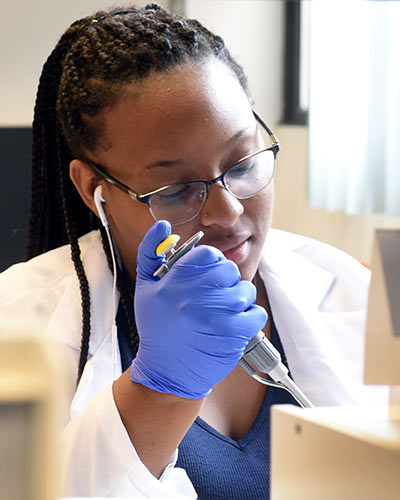 Kayla Rayford
Kayla Rayford
I graduated from Bowie State University in May 2017 with a BS in Biology and a minor in Chemistry. Before matriculating to Bowie State, I was in the UCLA Pre-College Science Education program which allowed me to conduct oral cancer research at UCLA’s school of Dentistry. Though my university did not have much research funding for students, I utilized my summers by participating in research opportunities at other universities such as The University of Oregon and Georgetown University.
Currently, I am working in Dr. Frieman’s lab understanding the mechanisms of diabetes enhanced MERS-CoV pathogenesis. Our lab primarily focuses on interaction between SARS-CoV, MERS-CoV and host organisms. With this extensive research experience and resources and guidance from STAR-PREP leadership, I hope to gain admission into a great graduate program in Microbiology/Immunology.
Cohort 1
 Hilary Bright
Hilary Bright
I graduated from the University of Maryland, Baltimore County (UMBC) in May 2016, with a BS in Biochemistry and Molecular Biology. Before attending UMBC, I was a part of the Science and Technology Program at Eleanor Roosevelt High School, located in Prince Georges County, MD. During my undergraduate career, I was part of the Meyerhoff Scholarship Program and was also funded by the National Institute for Drug Abuse (NIDA).
Currently, I am conducting research on the protein thymine-DNA glycosylase (TDG) in the laboratory of Dr. Alexander Drohat. TDG is an enzyme that removes thymine from T:G mismatch pairs. Our lab is primarily focused on determining how TDG recognizes T:G mismatch pairs, and its likely role in epigenetic regulation.
After finishing my time at UMB, I plan to pursue a MD/PhD in Human Genetics.
 Kevin Herold
Kevin Herold
I graduated from University of Maryland, Baltimore County (UMBC) with a bachelor’s degree in Biological Sciences. There, I conducted research under Phyllis Robinson, PhD, and Kathleen Hoffman, PhD, where I worked to mathematically model the phototransduction pathway of the photopigment melanopsin. I then went to Towson University and completed my master’s degree. At Towson I worked under Elana Ehrlich, PhD, to determine how the Kaposi’s sarcoma associated herpes virus manipulates signaling pathways in the host to promote viral latency.
I am working under Margaret McCarthy, PhD, whose research is focused on the effects of hormones on sex differences in the developing brain. My current project is centered around determining the influence of kinases downstream of endocannabinoid receptors in the brain on cell proliferation.
I want to gain the research and academic experience necessary to be accepted into a neuroscience PhD program where I can study the link between abnormal cellular processes in the brain and brain diseases.
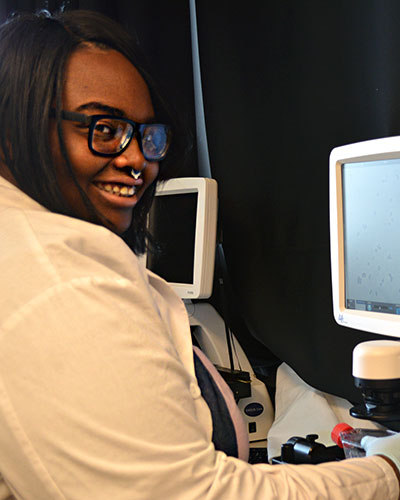 Dominique Parker
Dominique Parker
I graduated from Towson University in December of 2015 with a degree in Cell and Molecular Biology. My interest in immunology is fairly new; after losing my grandfather to lung cancer I became interested in the convoluted interactions that occur within our immune system. I want to purse an MD/PhD so that I am able to obtain knowledge in research and apply it to the clinical field. I feel as though it is important to treat the whole human body and not just the problem.
During my time at Towson University, I conducted research in a pathogenesis lab. We focused on the innate immunity, specifically Tir A, using Dictyostelium discoideum I was fortunate enough to work at another lab at the University of Iowa. We aimed to study the effects of micro RNA’s on Multiple Myeloma in hopes of finding a novel therapeutic discovery.
Currently, I am a STAR-Post baccalaureate student in Dr. Davila’s lab conducting exciting research. Here I am able to combine immunology and oncology together by understanding how cancers are able to suppress our immune system. We are looking at the interactions that occur between myeloid derived suppressor cells and CD8+ T-cells. Although, I lack experience with the adaptive immunity, I am excited for the new knowledge that I have already begun to obtain and I will continue to do so.
My ultimate goal is to discover novel immunotherapies for a variety of cancers and diseases and I am able to get the knowledge that I need to do so here at The University of Maryland, Baltimore.




.jpg)
.jpg)

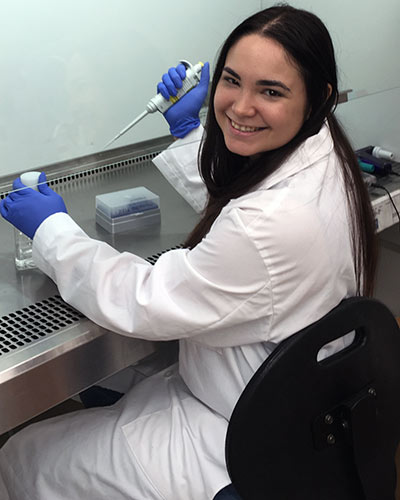
 Kanisa Davidson
Kanisa Davidson Antonio Figueiredo
Antonio Figueiredo Dillion Francis
Dillion Francis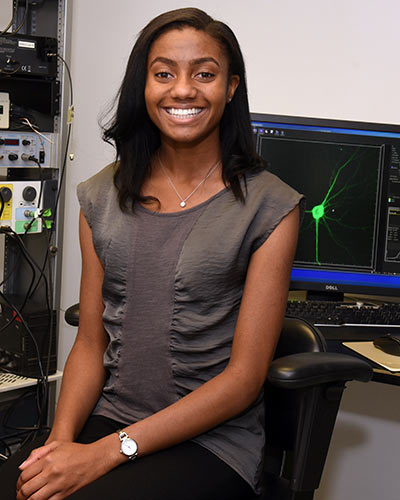
 Mc Millan Ching
Mc Millan Ching Edith Hernandez
Edith Hernandez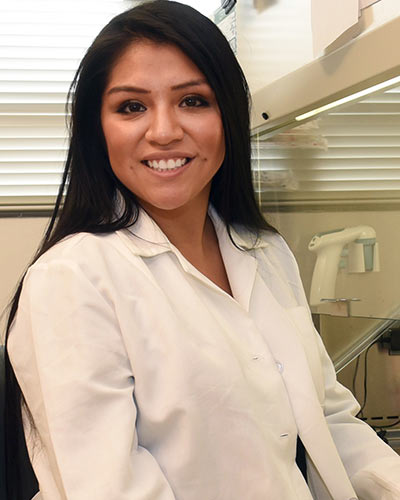
 Kayla Rayford
Kayla Rayford Hilary Bright
Hilary Bright Kevin Herold
Kevin Herold Dominique Parker
Dominique Parker